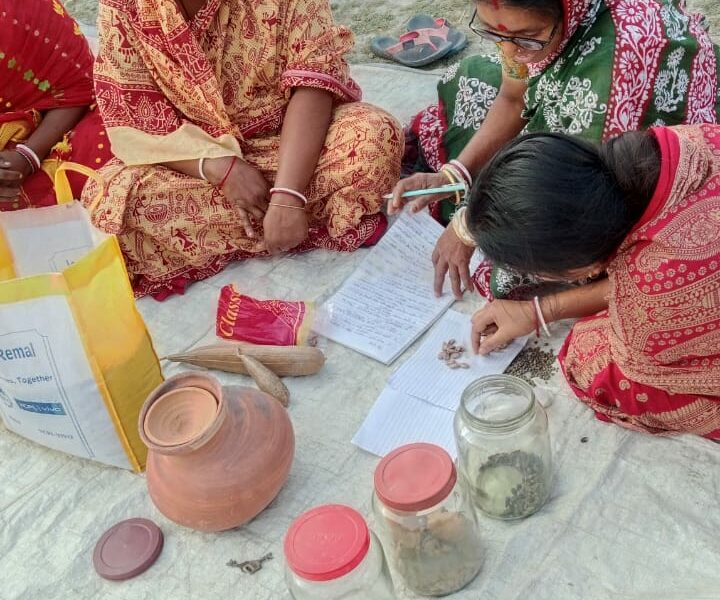

Seeds of Hope in the Saline Soil of Sundarbans — Mukti’s Community Seed Bank Initiative
Every year, vast areas of the Sundarbans face the harsh impacts of climate change — cyclones, tidal surges, and floods. The intrusion of saline water destroys soil fertility, severely affecting the region’s main livelihood: agriculture. With each farming season, local farmers struggle to restart cultivation on their damaged lands.
In search of a sustainable solution, the farmers began discussions with Mukti NGO. Through a series of community meetings, they realized that a seed preservation and exchange system could help them overcome the recurring crisis.
When floods destroyed all seeds during the first year, Mukti extended support by providing new seeds and essential materials. Soon after, three seed banks were established across the villages of Herambagopalpur region. The system operates on a simple rule — any farmer borrowing seeds from the bank must return double the quantity after harvest. This ensures a steady supply of seeds and allows other farmers to benefit in the future.
The initiative runs entirely on an exchange model, with no monetary transactions involved. If a farmer’s seeds are lost or damaged, they can return another variety instead. Additionally, Mukti provides training on organic farming, seed preservation, and pest and disease management, helping farmers adopt sustainable practices.
Now running successfully for two to three years, the initiative has become a lifeline for local farmers. Even during recent heavy rains that damaged many crops, farmers turned to these seed banks for help. By accessing stored seeds and returning to cultivation, they are sowing not just crops — but new seeds of hope in the saline soil of the Sundarbans.
Project Activities
- A village for independent and enterprising women (A VIEW) (5)
- About Mukti (4)
- Accreditation (14)
- AGM (63)
- Agriculture Reforms (124)
- Ambulance Service (2)
- Amplifying Community Voices (67)
- Awards (15)
- Awareness and Empowerment (134)
- Awareness drives (58)
- Bio-Village-Kankandighi (10)
- Careers (14)
- Chick Rearing Programme for Marginalised Women (16)
- CHILD (18)
- Climate Resilience River Embankment (46)
- Covid-19 (74)
- Cultural Shows (7)
- Cyclone Aila (13)
- Cyclone Amphan (44)
- Cyclone Bulbul (30)
- Cyclone Dana (3)
- Cyclone Remal (12)
- Cyclone Response & Recovery (90)
- Cyclone Tolerant Houses (15)
- Cyclone Yaas (57)
- Disaster Recovery (264)
- Editorial (56)
- Editorial by Abir Biswas (1)
- Editorial by Amit Kumar Dey (2)
- Editorial by Ananya Chatterjee (3)
- Editorial by Ankita Kothiyal (4)
- Editorial by Debabrata Halder (1)
- Editorial by Dr. Alokananda Ghosh Sengupta (2)
- Editorial by Kasturi Bakshi (1)
- Editorial by Monami Mitra (1)
- Editorial by Nandita (3)
- Editorial by Pampa Karmakar (1)
- Editorial by Pranay Patra (1)
- Editorial by Prof. Pradeep Ray (1)
- Editorial by Ranitendranath Tagore (1)
- Editorial by Sankar Halder (14)
- Editorial by Satyajit Ray (7)
- Editorial by Sohini Mehta (1)
- Editorial by Sonamon Basu (3)
- Editorial by Soumitra Bose (2)
- Editorial by Subhankar Basu (1)
- Editorial by Supriyo Banerjee (3)
- Editorial by Ujjwal Maity (2)
- Education and Enrichment (413)
- Environment and Resilience (127)
- Featured Activities (24)
- Gram Clinic (9)
- Health Water & Sanitation (95)
- HOPE (10)
- Impact Stories List (109)
- Integrated Development (211)
- International Management Institute (IMI) (2)
- Jal hi Kal (6)
- Kitchen Gardening (16)
- Livelihood & Enablement (219)
- MCDF (119)
- Medical Camp (44)
- MIT (8)
- MKSS (50)
- MSS (144)
- Mukti Academia (5)
- Mukti Academy (2)
- Mukti Craft (18)
- Mukti Cultural (2)
- Mukti Employment Exchange (MEE) (9)
- Mukti Fresh (15)
- Mukti Gram - Egra (11)
- Mukti Gram - Purbashridharpur (170)
- Mukti Green Defense in Sundarbans (11)
- Mukti Yoga (12)
- Mukto Dhara (2)
- Northumbria University (2)
- Obituary (6)
- Observance Days Celebration (53)
- Organic Farming & Training Support (45)
- Pond Rejuvenation (20)
- Prerana (1)
- Prerna (4)
- Projects For Mukti Wide (7)
- Queen Mary University of London (1)
- Rights and Special Needs (113)
- Run for Cause (13)
- Run4SafeFood (7)
- SDF (6)
- Shahoshini (9)
- Skill & Enterprise Development (21)
- Smart lab (5)
- Social Stock Exchange (2)
- Social Workers' Convention (1)
- Sundarbans Green (SUN-G) (15)
- Sunderban development fair project (4)
- Surya (12)
- Sustainable Agriculture Movement (63)
- SWAS-2-0 (18)
- Swastha Shongini (32)
- Swavalamban Accelerator in Sundarbans (SWAS) (21)
- Tour for Cause (45)
- TSS (196)
- UDAAN (7)
- Uncategorized (99)
- University of Calcutta (1)
- Value Education (12)
- Valued Partners (3)
- Vocational Trainings (15)
- VOICE (14)